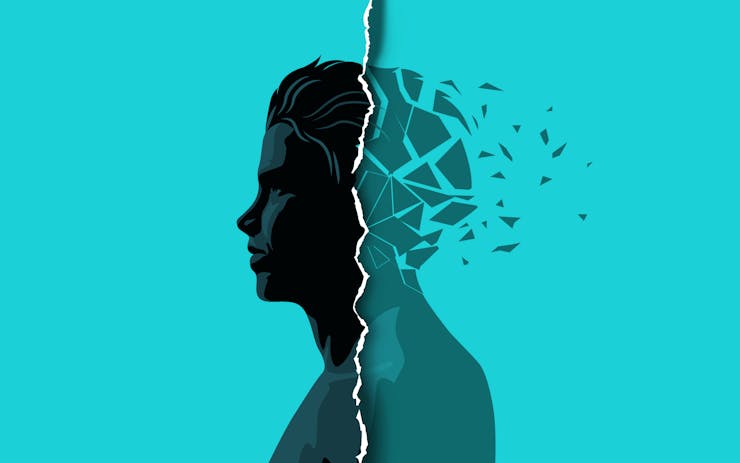My father passed away from cancer six weeks ago. The days after his death were characterized by the expected: disbelief, morbid Hallmark cards extending condolences, and dishes of limp lasagna left at the door. But the period following his passing was also colored by the unexpected.
I wasn’t expecting panic or anxiety. Nor was I expecting derailing flashbacks to the last week in the hospital, night after night of insomnia, or the decimation of my formerly robust immune system. In short, I wasn’t expecting grief.
Theoretically, I knew grief happened after a significant loss. I’d just somehow made it to 34 years of age without ever really experiencing it firsthand. In essence, grief is a common emotional response to a distressing situation. But although it’s normal, it can be utterly annihilating. Grief gathers up feelings and experiences—that are challenging enough to deal with on their own—into one giant, messy package that spills out over everything.
A small piece of cannabis-infused fudge
Deep down, I knew the grief and pain I was experiencing was something I had to work through. “The cure for the pain is in the pain,” says the poet Rumi. I wasn’t looking for benzodiazepines, antidepressants, or anti-anxiety meds to numb the feelings. But I did feel like I’d benefit from something that would allow me to elevate myself from the depths of the grief swamp, make sense of it, and muddle through the funeral and weeks that followed.
I found it in my refrigerator. One small piece of cannabis-infused fudge forged a small window of space in my head, allowing me to observe what was going on both inside and outside. A sense of peace descended, and I slept four hours that night.
Any grief-stricken person will tell you that grief can place you at the behest of your emotions, causing you to swing wildly between panic, sadness, regret, and anger. Compound this with sleep deprivation, and your ability to reflect and retain a sense of perspective is severely compromised. Ironically, a functioning reflective faculty is one of the things a grieving person misses most.
During the week leading up to the funeral and for a few days after, nuggets of fudge provided not an escape, but elevated respite. Throughout the constant coming-and-going of family, friends, funeral directors, and total randoms who stayed lingering long after they’d worn out their welcome, cannabis was my grief aid, helping me find presence in the moment. Those little nibbles of fudge enabled me to appraise the more challenging events with a sense of equilibrium and calm.
Openness to insight and meaning
Mickey Nulf, a cannabis educator and patient consultant, leaned into cannabis after he lost his mother to a drug overdose. For Nulf, cannabis helped him to confront his grief in a healthy way.
Shop highly rated dispensaries near you
Showing you dispensaries near“Cannabis kept my mind level as I was being rushed with emotions from the feelings of grief and sadness that I had. It allowed me to feel the feelings, but understand them at the same time,” explains Nulf. “It kept my anxiety down while the grief hit, and encouraged me to actually deal with the grief instead of just burying it.”
Grief is often tinged with moments of profound insight and meaning, and openness to these moments can make testing times easier to weather. Nulf recalls the most impactful moment he experienced was seeing his mom lying in the funeral home. “I hadn’t cried before then but cannabis allowed me to experience those feelings again. I dropped to my knees and cried for my mom. I was sad she was gone; sad that I didn’t get the chance to say ‘I love you,’” he reflects.
Nulf believes cannabis enabled him to access his feelings fully, which was essential to making sense of his mother’s death. “I was able to process the loss, and understand that the picture was greater than the loss,” he recalls. “I could see the tragedy but find happiness through it. It was a first for me in my lifetime.”
An expert’s opinion
But what do the experts think? While there are no clinical studies exploring cannabis use and grief, there is plenty of interest. “Currently, there is promising preliminary evidence about the efficacy of medical cannabis in the treatment of these conditions, all of which are hallmark features that characterize the constellation of grief symptoms,” observes Dr. Rahul Khare, MD, an expert on the medical applications of cannabis.
Large-scale clinical trials, however, are needed to draw firmer conclusions. It’s also vital to acknowledge that studies indicate that a grieving individual is more vulnerable to substance abuse, dependency, and addiction. A recent study also suggests that cannabis use among individuals with depression can be problematic and prevent them from seeking proper psychiatric care. Cannabis may straddle a fine line between helpful aid and problematic crutch.
Dr. Khare suggests that the key may be to combine cannabis with appropriate mental healthcare. “Although it is controversial, the current evidence suggests an overall promising relationship in the treatment of grief with medical cannabis, if such treatment is paired with proper psychiatric and mental healthcare by licensed professionals,” he reflects.
Khare is optimistic that cannabis could represent a powerful tool for helping with grief in the future. “In my personal experience treating patients with medical cannabis, I have found a marked decrease in the use of antidepressant medication as well as a reduction in opioid and benzodiazepine use as well,” he states. “I believe with further research, a more definitive link between the efficacious uses of cannabis for grief will be unveiled.”





